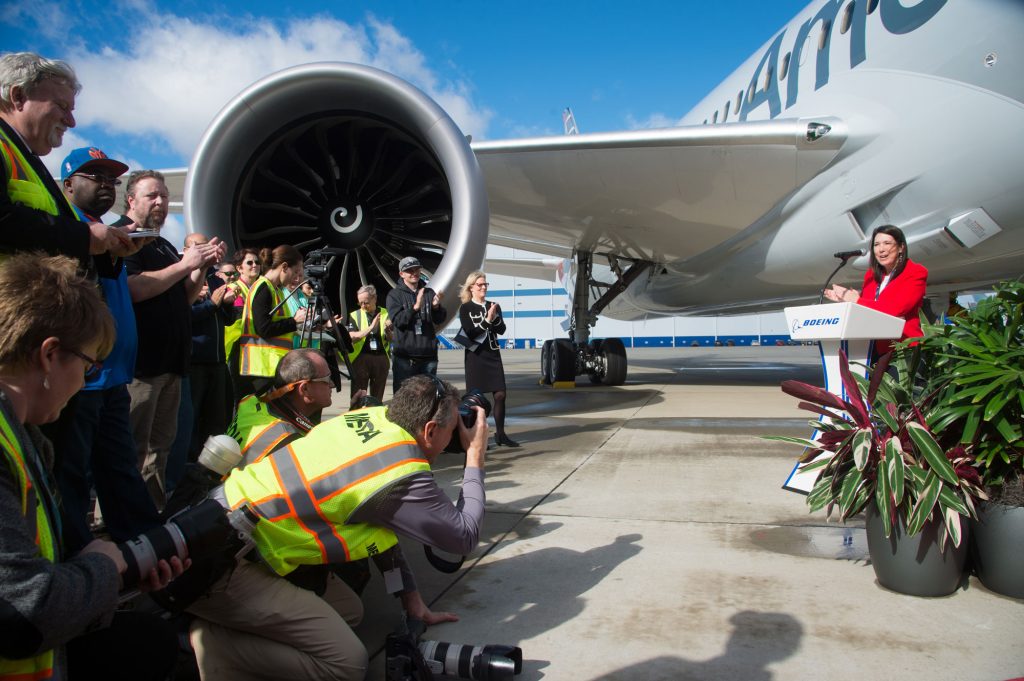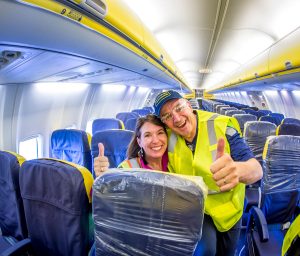Family, focus, and flying towards success
 Beverly Wyse (EMBA ‘05) acknowledges that she’s driven. In Wyse’s case, that drive manifests itself in a combination of innate motivations and highly developed leadership skills. Her job as president of Boeing Shared Services—a multibillion-dollar, nearly 6,000-person operating group providing common internal services across Boeing’s global enterprise—requires expansive ideas and a tremendous range of operational perspectives. Her natural abilities, such as curiosity, boldness and adaptability, are powerful catalysts when combined with strategic thinking and tactical analysis. And yet, all these attributes only begin to describe Wyse. She’s also humble, astute and warm.
Beverly Wyse (EMBA ‘05) acknowledges that she’s driven. In Wyse’s case, that drive manifests itself in a combination of innate motivations and highly developed leadership skills. Her job as president of Boeing Shared Services—a multibillion-dollar, nearly 6,000-person operating group providing common internal services across Boeing’s global enterprise—requires expansive ideas and a tremendous range of operational perspectives. Her natural abilities, such as curiosity, boldness and adaptability, are powerful catalysts when combined with strategic thinking and tactical analysis. And yet, all these attributes only begin to describe Wyse. She’s also humble, astute and warm.
Boeing is the world’s largest aerospace company. Its range of commercial, defense, and space products touch our lives and not only span the globe but reach far into the stars above. Wyse has been with Boeing since 1985. When asked about her substantial tenure with the company, she modestly replies, “Boeing has provided a fabulous, challenging career for me and my family. It may sound cliché to say the people are the best part, but it is those interactions that have taught me so much, helped me be successful and created the memories that make up a life,” she shares. “I have traveled the world, and made friends and contacts through our customers and global partners.”
 Those memories began unfolding after receiving her mechanical engineering degree from the University of Washington. Her first job out of college was at Boeing. During her early career, Wyse served as the director of strategy and business development for Connexion, the company’s previous in-flight internet connectivity service, and director of program management for the 757 aircraft program. Over the subsequent years, titles, roles and responsibilities grew as Wyse moved up through and around several key Boeing programs, including the 767 and Boeing Commercial Airplanes divisions. In the 767 program, Wyse was the first woman to run a wide-body aircraft program.
Those memories began unfolding after receiving her mechanical engineering degree from the University of Washington. Her first job out of college was at Boeing. During her early career, Wyse served as the director of strategy and business development for Connexion, the company’s previous in-flight internet connectivity service, and director of program management for the 757 aircraft program. Over the subsequent years, titles, roles and responsibilities grew as Wyse moved up through and around several key Boeing programs, including the 767 and Boeing Commercial Airplanes divisions. In the 767 program, Wyse was the first woman to run a wide-body aircraft program.
By 2010, Wyse had become vice president and general manager of the 737 program. Under her leadership, the team led design, development, certification, production and delivery of the 737 airplane family and 737 MAX production integration. This job was larger in scope and required site operations, investment in customer relationships and oversight of employee safety at the 737 production facility.
It wasn’t necessarily in my plan at the time, but I understood that an advanced degree in business was a potential life-changer for a career.
Wyse’s management skills navigating relationships and systems operations eventually landed her the role of vice president and general manager of Boeing South Carolina. There, she was responsible for all of Boeing’s operations and facilities in North Charleston, including 787 aft-body and mid-body operations, 787 final assembly and delivery operations, and oversight of the engineering design and IT centers.
In June 2016, Wyse moved into her current position as president of Boeing Shared Services. The department assists Boeing’s business units and corporate offices with 99 common internal services supporting the company’s global operations. Looking back over her 32 years with Boeing, Wyse says it was in 2004 that her professional life intersected with her personal life in ways she could never have imagined. Scott Carson, her boss at the time, saw Wyse’s exceptional leadership potential. He encouraged her to get an EMBA. She recalls, “Scott saw my aspirations and knew the capabilities required. He knew that having this type of advanced degree was necessary for me to achieve what was ahead of me. This was important for me to realize. It wasn’t necessarily in my plan at the time, but I understood that an advanced degree in business was a potential life-changer for a career.”
“When the idea first came up, I was hesitant,” Wyse admits. “My boys Evan and Elliot were only 11 and 12 years old, I’d just gotten a big new job, and I was incredibly busy trying to balance that life. When I shared my hesitance with Scott, he smiled and replied, ‘Awesome! I signed you up!’ I had much support from everyone, from Boeing and from my family, to actually make it happen. My husband Steve, who also worked at Boeing at the time, wanted me to pursue this and was on board from the beginning. Thanks to Boeing’s support, Steve took a two-year leave of absence to help take care of the boys. He got to spend time with the kids, I got settled into the new job and took on going to school. It was challenging, but it ended up being a win-win for everyone.”
All of us in school had to figure out how to make the pieces of our lives fit. So we did. On my team, we knew each other’s kids. We knew about each other’s families. We felt like our own family.
Wyse says she has tenacious dedication and laser focus. “I throw myself into my work and my family 120 percent. Working as much as I did and as focused as I was, I only had room in my life for those two things: excelling at my job and being there for my family. I had to create a separate space and make room for that third thing, which was school. It meant reworking my life in a way that all three pieces would fit. I had to make the pieces overlap.”
Wyse chuckles as she looks back. “While I was in school, I engaged with my kids, too. They were part of every step. Every test. All my homework assignments. They learned about my MBA and how to deal with spreadsheets.” She adds, “All of us in school had to figure out how to make the pieces of our lives fit. So we did. On my team, we knew each other’s kids. We knew about each other’s families. We felt like our own family. We talked about challenges, and for me, to make space for that third thing, I brought in wonderful Boeing case studies for my group to work on. By integrating the two most important elements of my life, my work and my home, I learned how to make room for the third. This was an important lesson for me in making it work.”
Another important lesson Wyse learned in the process of getting her MBA relates to both leading and working within teams. She explains, “An EMBA program is not just an academic exercise. Through real life industry examples, practical application and working intensely within teams of five or six people, you get exposure to partners with unique leadership approaches. Combined, these were very powerful.”
Being in a class of all leaders was interesting. They all had different skills. To work collaboratively in that environment meant that we had to learn in new ways.
“I was in a group with an entrepreneur, someone from the banking industry and an airline executive,” she continues. “Being in a class of all leaders was interesting. They all had different skills. To work collaboratively in that environment meant that we had to learn in new ways. When you aren’t the lead and are used to being a leader, it means time can be spent researching or observing, rather than being the one setting the tempo. There’s discomfort that can come with not leading, and we spent a lot of time talking about those discomforts.”
Wyse says this intense group experience and the structure of the EMBA education helped her learn to look externally for benchmarks, tactics and strategies, which became critical to her career and promotions at Boeing.
As president of Boeing Shared Services, Wyse oversees a wide range of global services, including maintaining and protecting the company’s worldwide sites; managing the sale and acquisition of all leased and owned property; purchasing non-production equipment and supplies; delivering a variety of human resources–related services; and managing the company’s business travel, expense and other financial services.
I wouldn’t have had any of my post-EMBA jobs if not for that degree. It enabled me to succeed in every way, from understanding complex financials, to developing skills around building teams, to always questioning the status quo and continuously setting appropriate strategies that evolve over time.
“It’s an exciting time to work in this aspect of the company,” she says. “There are huge opportunities with a CEO who’s very inspirational and focused on moving Boeing across many product components. Every day is exciting, being part of this constant change—being part of the future.”
Wyse believes her EMBA has contributed to her career in a meaningful way and helped her forge a path toward a level of professional success she couldn’t have achieved otherwise. “I wouldn’t have had any of my post-EMBA jobs if not for that degree. It enabled me to succeed in every way, from understanding complex financials, to developing skills around building teams, to always questioning the status quo and continuously setting appropriate strategies that evolve over time. It encouraged and reinforced the value of being a continuous learner; to develop methods for change management and to stretch and strive for those things have kept me successful.”
Wyse concludes by sharing, “The greatest gift I received was the people who shared this experience with me: the professors, the staff and my teammates. We were all close as we worked to support each other. Though I’m a lifelong learner, I miss how close the EMBA team was. The time was challenging, balancing work, family and school, but I can’t imagine that anyone has come out of the program close to regretting it. It’s one of those experiences that far exceeds expectations.”
